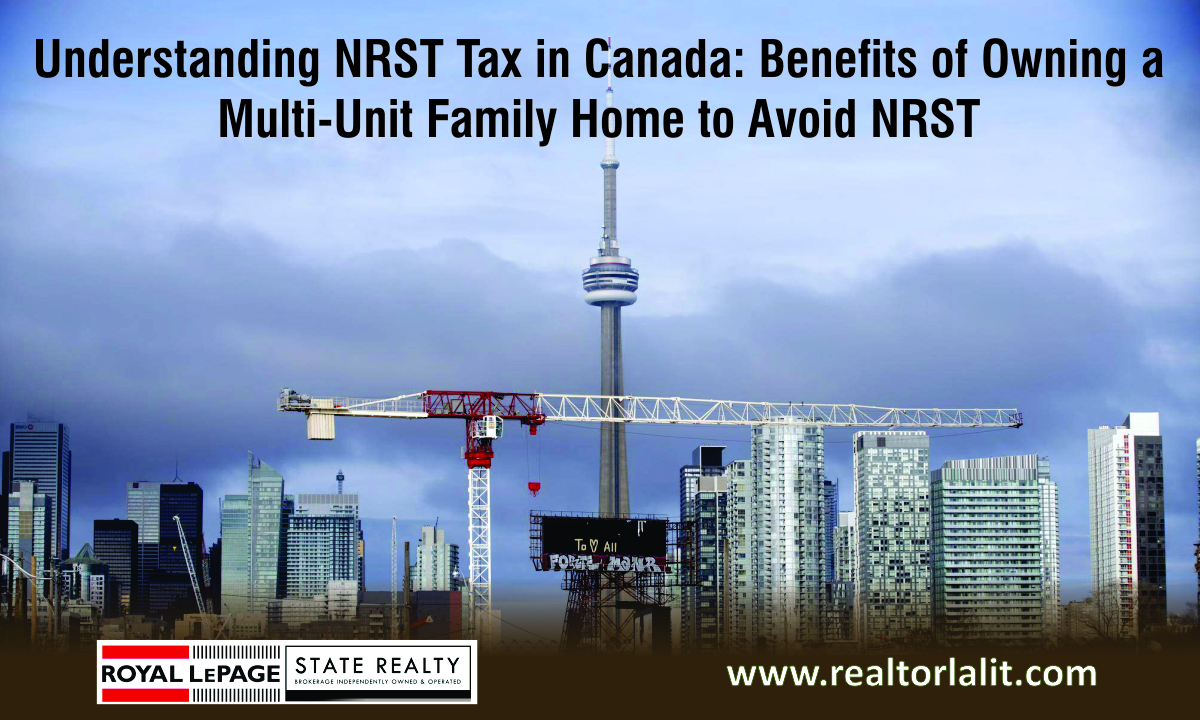Understanding NRST Tax in Canada: Benefits of Owning a Multi-Unit Family Home to Avoid NRST
The NRST Tax and Its Impact on Foreign Buyers
In recent years, Canada has seen an increasing number of foreign investors looking to buy property, particularly in cities like Toronto, Vancouver, and Montreal. To curb this growing trend and ensure that locals can still afford housing, the Non-Resident Speculation Tax (NRST) was introduced in Ontario, specifically targeting foreign buyers.
The NRST is a tax imposed on individuals who are not Canadian citizens or permanent residents of Canada and who are purchasing property in certain regions. The tax is part of the provincial government's effort to address housing affordability issues and protect local residents from being priced out of the market by foreign investment.
This blog will explore the NRST tax, its implications for potential buyers, and how owning a multi-unit family homecan help both residents and foreign buyers avoid this tax. We will also highlight the advantages of multi-unit homes as investment properties and provide practical advice for prospective buyers.
What is the Non-Resident Speculation Tax (NRST)?
The NRST was introduced in 2017 by the Ontario government as part of broader measures to cool the real estate market, particularly in Toronto. This tax applies to non-resident buyers who purchase residential properties in the Greater Golden Horseshoe (GGH) region of Ontario, which includes Toronto and surrounding cities.
Current NRST Tax Rate:
- The NRST is set at 25% of the purchase price of residential properties in Ontario.
- The tax applies to individuals who are not Canadian citizens, permanent residents, or individuals holding a valid work permit in Canada. Foreign corporations and foreign-controlled corporations are also subject to the NRST.
Who is Exempt from the NRST?
- Canadian citizens or permanent residents are not subject to the NRST.
- Certain foreign nationals, such as those with work permits or spouse or common-law partners who are Canadian citizens or permanent residents, may be exempt under specific conditions.
- Refugees and individuals who have applied for permanent residency under certain circumstances may also qualify for exemptions.
How Can Multi-Unit Family Homes Help Avoid the NRST?
One of the ways to avoid the NRST tax is by purchasing a multi-unit family home, which is generally exempt from this tax if certain conditions are met. A multi-unit family home is a property that contains more than one self-contained unit, usually aSixplex or Multiplex. These homes can be used as primary residences or investment properties, offering a wide range of benefits to buyers, including those trying to avoid the NRST.
Multi-Unit Family Homes: A Strategy to Avoid NRST
In Ontario, multi-unit family homes may not be subject to the NRST if they meet the requirements set out by the government. This is especially beneficial for foreign buyers or those who might otherwise be subject to the NRST.
Here’s how multi-unit homes can help:
- Multiple Residences on One Property: A multi-unit family home is viewed differently from a single residential home. If the property has multiple units, it could be considered an investment property, rather than a single-family home, potentially exempting the buyer from the NRST. This applies especially when the buyer intends to rent out units, as this investment strategy helps avoid the NRST by classifying the property differently.
- Primary Residence vs. Investment Property: If a foreign buyer purchases a multi-unit family home and plans to occupy one of the units as their primary residence while renting out the other units, it could help them avoid the NRST. The key is the intention of use—if at least one unit is for personal use, and the remaining units are used for rental income, the property may not be subject to the NRST.
- Legal Requirements: There are some legal guidelines to consider, such as ensuring that the property complies with local zoning laws and is officially classified as a multi-family residential property. In many cases, local municipalities may require separate entrances, kitchens, and bathrooms for each unit for it to be classified as a multi-unit property.
The Benefits of Owning a Multi-Unit Family Home
Owning a multi-unit family home in Ontario offers several advantages, particularly for investors looking to generate rental income and take advantage of tax exemptions like the NRST. Aside from the potential to avoid the NRST, there are other benefits to owning a multi-unit home, especially for first-time buyers or those who wish to enter the real estate market.
Benefits for Foreign Buyers
Foreign buyers may have limited options when purchasing a property in Ontario due to the NRST. However, multi-unit properties offer the following benefits:
- Reduced Tax Burden: By purchasing a multi-unit home, foreign buyers may avoid the NRST tax entirely, provided they meet the legal requirements mentioned earlier. This can result in significant savings, especially on higher-priced properties in areas like Toronto.
- Diversification of Income Streams: Multi-unit homes provide an opportunity for buyers to diversify their investment. With multiple rental units, owners can benefit from several income streams, lowering the risk associated with relying on a single tenant or property.
- Capital Appreciation: Multi-unit properties tend to appreciate faster due to the demand for rental units. In Ontario, cities like Toronto, Hamilton, and Stoney Creek have seen significant real estate appreciation over the past decade. Foreign buyers who invest in multi-unit properties can benefit from both capital appreciation and steady rental income.
Benefits for First-Time Homebuyers
First-time buyers can also benefit from purchasing a multi-unit family home, especially if they intend to live in one of the units while renting out the others. Some advantages include:
- Build Equity Faster: As the buyer makes mortgage payments, they are building equity not only in their primary residence but in the rental units as well. This means that, over time, they will gain ownership in the entire property, which could significantly appreciate.
- Rental Income Helps Offset Costs: Renting out the additional units helps offset the cost of the mortgage, property taxes, and maintenance expenses. This can make homeownership more affordable for first-time buyers, especially in high-demand areas.
- Government Grants and Incentives: For first-time buyers, the Ontario government offers various incentives, such as the Land Transfer Tax rebate. In addition, multi-unit homes may qualify for certain renovation grantsand government incentives if they are considering additional dwelling units (ADU)
Case Study: Avoiding NRST Through Multi-Unit Property Ownership
Let’s consider a hypothetical scenario to demonstrate how a multi-unit family home can help a foreign buyer avoid the NRST.
John, a Foreign Investor: John is a foreign national looking to purchase a property in Stoney Creek, Ontario. He is interested in asixplex priced at $1.2 Million
- Scenario 1: Single Unit Purchase: If John had purchased a single-family home in the same area, he would have been subject to the 25% NRST, which would amount to $300,000.
- Scenario 2: Multi-Unit Home Purchase: By purchasing the duplex, John plans to live in one unit and rent out the other. He does not have to pay the NRST, and he gains the benefit of rental income from the other unit, which could amount to approximately $7500 per month. This rental income helps offset his mortgage payments, potentially turning his investment into a profitable venture.
This strategy allows John to avoid the NRST while benefiting from the cash flow generated by the rental unit, not to mention the long-term property appreciation.
Conclusion: NRST and Multi-Unit Properties – A Winning Strategy
>The Non-Resident Speculation Tax (NRST) in Ontario has made it more challenging for foreign buyers to enter the housing market. However, purchasing a multi-unit family home can offer a strategy to avoid this tax while also providing other long-term financial benefits, such as rental income and property appreciation. For first-time buyers and foreign investors, multi-unit properties present an opportunity to build equity, offset mortgage costs, and enter the competitive Ontario real estate market.
If you're considering investing in a multi-unit family home in Ontario, it’s important to consult a real estate professional to ensure you meet the legal requirements and maximize your investment. Always consider your long-term goals, potential rental income, and property appreciation before making a purchase.
Disclaimer:
The information in this blog is provided for general informational purposes only. All data and tax laws referenced may change over time. It is crucial to verify any information independently and consult with a professional advisor or real estate agent before making any investment decisions. Real estate markets fluctuate, and individual circumstances vary. Always seek personalized advice tailored to your unique situation before making any financial commitments.











